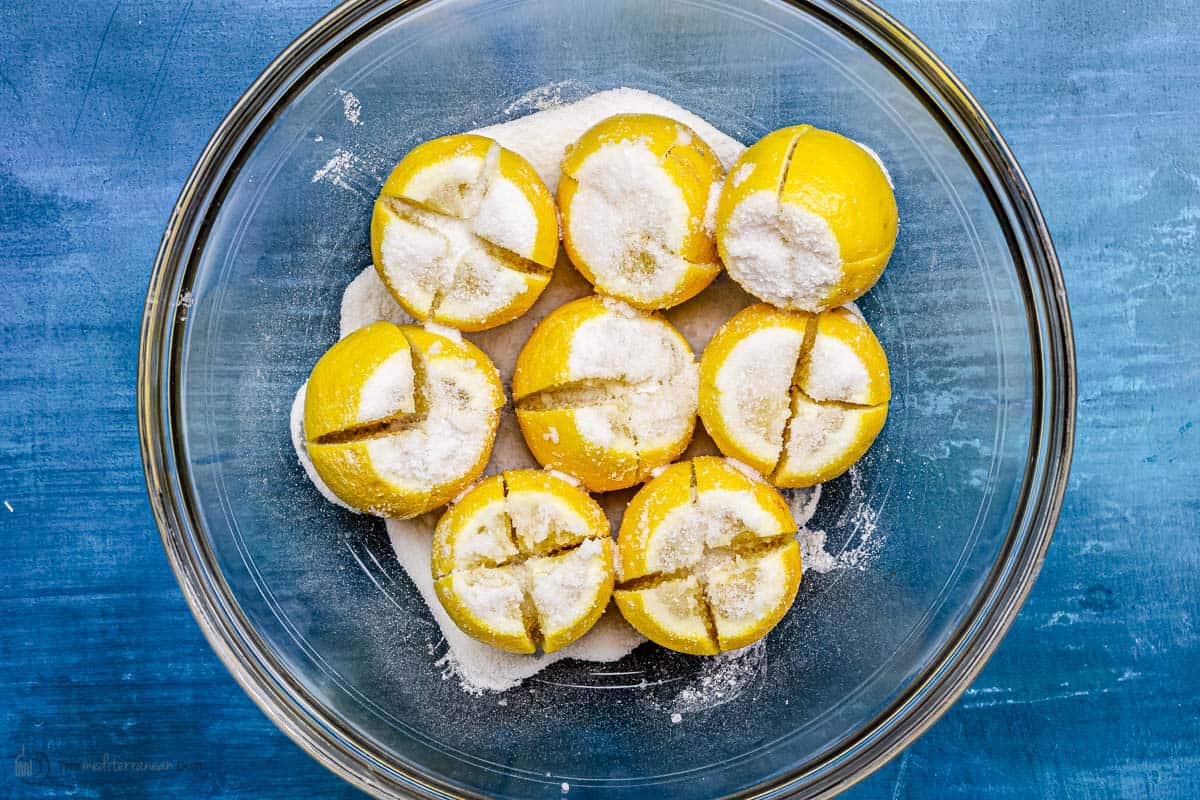
Preserved lemons are a delightful ingredient that can add a burst of tangy and intense flavor to your dishes. From salads to stews, these flavorful gems have become a staple in many cuisines around the world. By using a simple preservation method, lemons are transformed into a versatile ingredient that can elevate any dish.Preserved lemons are created by pickling lemons in salt and their own juices, resulting in a unique and vibrant flavor profile. This process not only enhances their taste but also extends their shelf life, making them a perfect addition to your pantry.In this article, we will explore 20 fascinating facts about preserved lemons. From their origins and culinary uses to their health benefits and storage tips, you’ll discover everything you need to know about these zesty treats. So, let’s dive in and explore the world of preserved lemons!
Key Takeaways:
- Preserved lemon, a tangy and versatile ingredient, has a rich history dating back to ancient times in the Middle East and North Africa. It adds a unique citrusy twist to dishes and is packed with nutrients.
- From enhancing Mediterranean and Middle Eastern cuisine to being a secret weapon for chefs, preserved lemon offers a burst of intense lemon flavor and can be used in a wide range of dishes, from salads to desserts and even cocktails.
The Origins of Preserved Lemon
Preserved lemon, also known as lemon pickle or lemon confit, has a long history dating back to ancient times in the Middle East and North Africa.
Traditional Method of Preservation
The process of preserving lemons involves packing them in salt and their own juices, which creates a unique tangy flavor and tender texture.
Versatile Culinary Ingredient
Preserved lemon adds a burst of bright citrus flavor to a wide range of dishes, including salads, tagines, soups, and even cocktails.
A Unique Flavor Profile
The preserved lemon develops complex flavors, balancing the intense tartness with a slightly sweet, salty, and umami taste.
Enhances Mediterranean and Middle Eastern Cuisine
Preserved lemon is a staple in Moroccan, Egyptian, and Lebanese cuisines, adding a distinctive flavor to signature dishes like couscous, hummus, and grilled meats.
Rich in Nutrients
Preserved lemon retains many of the nutritional benefits of fresh lemons, including high levels of vitamin C, antioxidants, and fiber.
A Natural Preservative
Preserved lemon is a natural way to extend the shelf life of lemons without the need for artificial preservatives or additives.
Used in Traditional Medicine
In traditional medicine, preserved lemon is believed to aid digestion, boost the immune system, and provide relief from common ailments like sore throat and indigestion.
A Favorite Among Chefs
Celebrity chefs worldwide embrace preserved lemon for its unique flavor and ability to elevate dishes with its vibrant citrusy notes.
DIY Preserved Lemon
Many home cooks enjoy making their own preserved lemon, which requires minimal ingredients and provides the satisfaction of creating a homemade pantry staple.
Preserved Lemon Variations
While traditional preserved lemon is made with salt, variations often include additional spices and herbs such as bay leaves, cinnamon, or cloves for added depth of flavor.
Brings a Tangy Twist to Salads
Sliced or diced, preserved lemon adds a tangy kick to salads, enhancing the flavor profiles and providing a unique contrast to fresh greens and vegetables.
A Culinary Secret Weapon
Chefs and home cooks alike consider preserved lemon as a secret ingredient to transform ordinary dishes into extraordinary culinary creations.
Provides an Intense Lemon Flavor
Preserved lemon delivers a concentrated lemon flavor that is more robust and pronounced than fresh lemon juice, making it a prized ingredient in many recipes.
Used in Gourmet Condiments
Preserved lemon is an essential ingredient in some gourmet condiments like chutneys, relishes, and vinaigrettes, adding a zesty and tangy touch.
Perfect Pairing with Fish and Seafood
The bright and bold flavor of preserved lemon compliments the delicate taste of fish and seafood, making it a popular choice among seafood lovers.
Global Popularity
Preserved lemon has gained popularity worldwide, transcending cultural boundaries and finding its way into the kitchens of food enthusiasts across the globe.
Traditional Ramadan Staple
In Middle Eastern cuisine, preserved lemon is often enjoyed during the holy month of Ramadan, adding a refreshing and tangy element to festive meals.
Preserved Lemon Desserts
Interestingly, preserved lemon can also be used creatively in desserts like cakes, cookies, and tarts, offering a unique twist on traditional sweet treats.
Preserved Lemon Mixology
Bartenders have discovered the unique flavor profile of preserved lemon and have incorporated it into cocktails, infusing a refreshing citrusy taste in their creations.
Conclusion
In conclusion, preserved lemons are a fascinating and versatile ingredient that has been utilized in various cuisines for centuries. From their tangy and intense flavor to their numerous health benefits, preserved lemons add a unique and distinct taste to a wide range of dishes. Whether you use them in savory recipes, marinades, dressings, or even cocktails, preserved lemons can elevate the flavors and bring a burst of brightness to your culinary creations. So next time you come across preserved lemons in a recipe or at the grocery store, don’t hesitate to give them a try and discover the delightful world of preserved lemon-infused dishes.
FAQs
1. What are preserved lemons?
Preserved lemons are lemons that have been pickled and preserved in a mixture of salt and their own juices. This preservation method results in a unique flavor profile and texture that is tart, tangy, and slightly salty.
2. How do I use preserved lemons?
Preserved lemons can be used in a variety of ways. They can be finely chopped and added to salads, tagines, stews, or roasted vegetables. They can also be blended into dressings, sauces, or spreads to add an extra depth of flavor.
3. Are preserved lemons good for you?
Yes, preserved lemons are not only delicious but also offer health benefits. They are a rich source of vitamin C, antioxidants, and dietary fiber. Additionally, they can aid in digestion and help support a healthy immune system.
4. Can I make my own preserved lemons?
Absolutely! Making your own preserved lemons is a straightforward process. All you need are lemons, salt, and a sterilized jar. There are many recipes and methods available online that can guide you through the process.
5. How long do preserved lemons last?
When stored properly in a sterilized jar and refrigerated, preserved lemons can last for several months, and their flavor will continue to develop over time. Just make sure to use clean utensils when retrieving lemons from the jar to avoid contamination.
6. Can I substitute fresh lemons for preserved lemons in recipes?
While fresh lemons can provide a similar level of acidity, they cannot replicate the unique flavor profile of preserved lemons. It’s best to use preserved lemons when specified in a recipe to achieve the desired taste and texture.
Preserved lemons bring a unique, tangy flavor to dishes, but there's more to explore in the culinary world. Discover how Breeze Flavors can add a surprising twist to your recipes, or learn about the versatile condiment mayonnaise. If you're curious about other preservation methods, dive into the fascinating world of pickling.
Was this page helpful?
Our commitment to delivering trustworthy and engaging content is at the heart of what we do. Each fact on our site is contributed by real users like you, bringing a wealth of diverse insights and information. To ensure the highest standards of accuracy and reliability, our dedicated editors meticulously review each submission. This process guarantees that the facts we share are not only fascinating but also credible. Trust in our commitment to quality and authenticity as you explore and learn with us.


